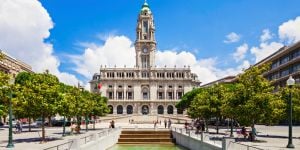Buying property in Portugal
Hi,
can a foreigner buy property in Portugal?
If so, is it complicated? What is the process of purchasing a property in Portugal?
Any tips for buying property, such as a check-list of items to verify ?
Thanks in advance for participating!
Christine
Yep a foreigner can buy a property in Portugal.
Make sure you find a good lawyer but not one that is recommended by the estate agent or builder. Most estate agents you can't trust as far as you can spit. Try and buy privately if possible and if necessary employ a translator.
The majority of people I know who have bought properties including myself now say they wish they'd rented first for at least a year.
Bom Ano Novo!
Hi pigletinportugal!
Thanks for your help!
Armand
HI! Bad people can be found everywhere, in all business activities, even in friendly relationships. Not all lawyers or real estate agents or builders ( etc ) are bad, you should not generalize because that is unfair.
Buying a house in Portugal ( anywhere ) require a simple thing, intelligence. When one is intelligent he / she will rule over his own business, buy a house is the business.
I agree for not hire the estate agent or builder recommended lawyer, but I strongly recommend to hire a lawyer rather than a solicitor.
When you hire a lawyer try to do it in writing and set up a honorary list, you will not end in a trouble of having to pay a fortune to the lawyer. When he / she presents you the price list I suggest you to argue about and try to negotiate it. Everything you do with lawyers, builders, real estate agents, etc, do it in writing.
They will come up with their agreements but you will always be able to make your changes in it, again and again until you both have found the perfect agreement.
When someone buys a property and ends up in trouble somehow, go to the real estate agent and ask him / her to fix it up, they must have an insurance policy that covers many problems that occur after the sale. If you bought directly you will not have this legal tool on your behalf.
But if you buy directly you will save the lawyer and other intermediates fees, you can do great deals if you follow the advice, make an agreement with the property owner, in writing, put everything down and you will be secure.
There are bad lawyers and bad builders and bad a thousand of other people only because there was a bad buyer doing a bad business advised by bad advisers and reading bad text in bad places on the internet.
So, it is resumed to just one little thing, "If you don't design your own life plan, chances are you'll fall into someone else's plan. And guess what they have planned for you? Not much".
[Moderated: pls avoid copy/paste on the forum]
Buying a house in Portugal is easy
Any foreigner can buy a house in Portugal
Step 1: Pick your Choice Estate agent and Property
Speak with real estate agent to find out more about the properties available in Portugal.
Step 2: Check it Out
Once a property has been chosen, you should appoint a lawyer who will carry out a number of checks on your behalf, thus reassuring you that all the important aspects for the sale are in place.
Most lawyers will research:
1 The title of the property
2 If the person or company selling actually owns the property. Whether there are any outstanding charges or costs associated with the property
3 If the appropriate building licenses or permissions are in order should you buy a plot of land
4 That the terms and conditions stipulated by the vendor are fair and legal
Step 3: Fiscal Representative
You will need to appoint a Fiscal representative. Under Portuguese law any non‐resident purchaser of property must appoint a Fiscal representative in Portugal. This representative will arrange the creation of your Portuguese tax number, which is required for the purchase, and manage any taxation liabilities that you may have in Portugal on an ongoing basis.
Step 4: Banking in Portugal
Opening a bank account in Portugal is not required, but it is recommended. Many foreign banks have branches in Portugal, and they can help in transferring funds and setting up regular payments for utilities so you won't have to worry about keeping a close eye on bills when you are out of the country. Property management companies can work directly with banks to set up these payments, and they can also arrange to have your Portuguese property rented out.
Step 5: Promissory Contract
To complete the purchase, your lawyer will need to prepare a CONTRATO DE PROMESA DE COMPRA E VENDA (CPCV) Or PROMISORY CONTRACT
This contract stipulates the details of the Purchaser, Vendor and property together with all conditions, payments, timings, etc, which have been agreed between all the parties. Having reviewed the lawyers report and should you wish to proceed, you will be required to complete and sign a CPCV. The CPCV is the contract of sale and is legally binding. At this stage, you will be required to pay the balance 10% downpayment.
Step : Signing the Deed
At the time of signing the Promissory Contract, both the vendor and purchaser agree on a date when the Escritura de Compra e Venda, the deed of transfer, will be signed. You can either attend the signing in person or grant your lawyer power of attorney to attend and sign on your behalf.
The Escritura is signed in the presence of a notary* (Notário) who will draw up the Escritura de Compra e Venda based on the information contained within the Promissory Contract. The notary will ensure that the title deeds have been exchanged and all conditions have been understood by all parties concerned.
Following the signing of the Escritura, the notary bears witnesses to payment, or an acknowledgment that the full payment has been made, and this fact is incorporated in the title deed.
The buying fees:
These fees are the buyers responsibility and will include the following:
1) The notary & escritura fee. Between 400 euros. The notary is an independent body and is present at the signing of the papers at the Escritura.
2) IMT (buildings and land tax) payable. Between 0% and 6.5% of the purchased price
This taxe is based on a sliding scale depending on the purchase cost of the property. It also varies depending on whether the property is to be a holiday home/second home or permanent residence.
3) The property registration fees. 250 euros
4) The Stamp Tax 0,8 % of the purchased price
In Portugal it is the seller who pays real estate fees, not the buyer.
Hi,
When you buy a property in Portugal you have 2 taxes.
- IMT = 0% if the purchasing price is below 92.407 euros
- Imposto de selo = 0,8 % whatever the purchasing price
Best regards
[moderated: no free ads please register your company in the business directory]
Buying a house in Portugal is easyAny foreigner can buy a house in PortugalStep 1: Pick your Choice Estate agent and Property Speak with real estate agent to find out more about the properties available in Portugal.Step 2: Check it Out Once a property has been chosen, you should appoint a lawyer who will carry out a number of checks on your behalf, thus reassuring you that all the important aspects for the sale are in place.Most lawyers will research: 1 The title of the property 2 If the person or company selling actually owns the property. Whether there are any outstanding charges or costs associated with the property 3 If the appropriate building licenses or permissions are in order should you buy a plot of land 4 That the terms and conditions stipulated by the vendor are fair and legal Step 3: Fiscal RepresentativeYou will need to appoint a Fiscal representative. Under Portuguese law any non‐resident purchaser of property must appoint a Fiscal representative in Portugal. This representative will arrange the creation of your Portuguese tax number, which is required for the purchase, and manage any taxation liabilities that you may have in Portugal on an ongoing basis. Step 4: Banking in PortugalOpening a bank account in Portugal is not required, but it is recommended. Many foreign banks have branches in Portugal, and they can help in transferring funds and setting up regular payments for utilities so you won't have to worry about keeping a close eye on bills when you are out of the country. Property management companies can work directly with banks to set up these payments, and they can also arrange to have your Portuguese property rented out.Step 5: Promissory ContractTo complete the purchase, your lawyer will need to prepare a ‘CONTRATO DE PROMESA DE COMPRA E VENDA’ (CPCV) Or ‘PROMISORY CONTRACT’ This contract stipulates the details of the Purchaser, Vendor and property together with all conditions, payments, timings, etc, which have been agreed between all the parties. Having reviewed the lawyer’s report and should you wish to proceed, you will be required to complete and sign a CPCV. The CPCV is the contract of sale and is legally binding. At this stage, you will be required to pay the balance 10% downpayment.Step : Signing the DeedAt the time of signing the Promissory Contract, both the vendor and purchaser agree on a date when the Escritura de Compra e Venda, the deed of transfer, will be signed. You can either attend the signing in person or grant your lawyer power of attorney to attend and sign on your behalf. The Escritura is signed in the presence of a notary* (Notário) who will draw up the Escritura de Compra e Venda based on the information contained within the Promissory Contract. The notary will ensure that the title deeds have been exchanged and all conditions have been understood by all parties concerned. Following the signing of the Escritura, the notary bears witnesses to payment, or an acknowledgment that the full payment has been made, and this fact is incorporated in the title deed. The buying fees:These fees are the buyers responsibility and will include the following:1) The notary & escritura fee. Between 400 euros. The notary is an independent body and is present at the signing of the papers at the Escritura.2) IMT (buildings and land tax) payable. Between 0% and 6.5% of the purchased priceThis taxe is based on a sliding scale depending on the purchase cost of the property. It also varies depending on whether the property is to be a holiday home/second home or permanent residence.3) The property registration fees. 250 euros4) The Stamp Tax 0,8 % of the purchased priceIn Portugal it is the seller who pays real estate fees, not the buyer.
-@casapt
This is all nonsense just use a Portuguese Notraio...
Non residents can buy if they get a Nif Tax number.
[link moderated]
165 000 euro.
[link moderated]
148 000 euro
[link moderated]
45 000 euro
Info on buying theses sites
@stevebrown55426
Hi Steve, my Son and Daughter just bought a house outside Lisbon and need to make reservations, any body you would suggest to do the reservations?
Hello everyone,
Please note that this is quite an old thread so most probably some info might be obsolete.
I would suggest members to open a new topic on the Portugal forum should they have questions about buying property.
All the best
Bhavna
Make your relocation easier with the Portugal expat guide

Accommodation in Portugal
As you are planning your move to Portugal, one of the key things that you will need to decide is where you are ...

Buying property in Lisbon
So, you are finally in Lisbon! You have a flat and a job, and your life is moving forward quickly. Well done! But ...

Dating in Portugal
If it's true that dating in general can be tricky and present its challenges, even more so when we talk about ...

Diversity and inclusion in Portugal
Before embarking on a journey to a new country and completely uprooting yourself towards a new life and a new ...

Sports in Lisbon
After a couple of weeks of dining on delicious Portuguese food, sipping vinho verde and snacking on pastel de ...

Work in Porto
In the past few years, the labor market in Porto has suffered a considerable boom, as new local businesses and ...

Internships in Portugal
Many students and young professionals dream of acquiring professional experience in a foreign country. More often ...

The health system in Portugal
When moving to a new country, healthcare might very well be one of the most important factors to consider. This ...
Forum topics on housing in Portugal



